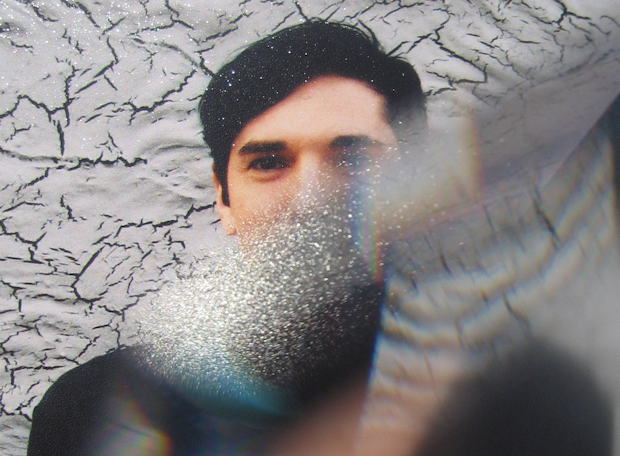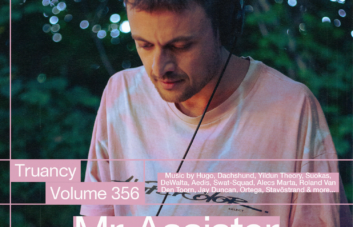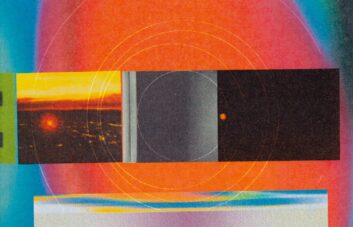The regression towards the mean, the second album syndrome seems to be an obstacle for a lot of artists who reach that point in their lifework, and so it was quite plausible that Dutch producer Martyn (Martijn Deijkers) could’ve been prone to this sophomore blues after releasing his much acclaimed debut album, “Great Lengths” in 2009. One of the most eagerly awaited follow-ups of the year has to be awarded to Martyn, as his first venture on his own label 3024 amassed a legion of fans and completely rewrote the rulebook with an array of forward thinking productions. Fast forward two years, and he gets set to release “Ghost People” on Flying Lotus’ label Brainfeeder next week (October 10th). The album is an outstanding piece of work, delving into different genres and times, once again showing his continually leading-edge progress as an artist. Looking at other contenders in this crossing of electronic music, it is beyond question that “Ghost People” has to be one of the most unparalleled records out this year, as there is simply no-one that seems to have achieved such quality, variation yet cohesion and str8-up vibes enclosed into one full-length album. We caught up with Martyn to talk about his accomplice Erosie, his musical influences as well as previous collaborations and the weight of aforementioned second album syndrome and how he ended up suppressing it.
Firstly, I wanted to talk about the album launch that went down in London. I was lucky enough to attend, and can only imagine the sort of work that went into creating an environment like that. “It was a lot of work but thankfully we did have the help from the people over at Ninja Tune (who distribute Brainfeeder in Europe) and Black Atlantic. Basically, Erosie was over in London for a couple of days prior to the gig to do all the painting and preparation with the Black Atlantic people. I was super happy with the result, it was a very nice vibe and great music from start to finish in my opinion!” I heard you had problems finding a venue which allowed Erosie to change that much of the venue. “Not necessarily problems, but the fact that a lot of the obvious standard choices for clubs were immediately ruled out. Not only did we have to change the venue but we also had to change it all back to normal white walls! Haha.”
Your live show is incredibly impressive. Can you give us an insight to how long the thought of doing one had been about? “Well, during the making of “Ghost People” I was playing with ideas to take the music from the album, live. This was mainly because over the last years I had DJ’d at quite a lot of gigs, especially festivals, where I think it would have been better if I could’ve presented my music in a live way. I’d be playing a DJ set say between Caribou , Daedelus or Flying Lotus and be thinking to myself that it didn’t make sense, because people would walk away and the end of my set, they only had heard me play other peoples music and no-one would know what Martyn sounds like. I thought taking this album live would make it easier for people to hear what I’m all about. That’s how it all started, and it ended up being pretty much trial and error from there onwards. My setup is quite basic so the first couple of gigs felt a bit static or stuff.” Does this mean the second album takes up a large percentage of your live show? “Yeah, it started as a representation of the second album but it has now morphed in some sort of ‘best of Martyn’ with lots of new bits in there.”
You finished the live show at your album launch with some jungle and drum and bass. Is this still something you still listen to or have any desire to still produce? “It’s more something I like to do for the live sets but not really something I’d produce, although Ghost People does have some jungly/breakbeat influences especially with “Popgun” and “We Are U In The Future”. “
Do you find you have to work the crowd differently when doing live sets instead of DJ-sets? “Yes indeed, it’s very different especially in the preparation. I like to do both equally, though. The live sets have helped me free up in my DJ’ing so now I really don’t feel compelled to play any of my own stuff when DJ’ing nowadays. I approach it more like ‘play what I love and what I like right now” while the live thing of course is a representation of me as a producer.”
Now that the album is finished and on its way, can you tell us a little about it and how you look back on the way you approached it? In a recent interview you stated you were suffering from the ‘second album syndrome’. “Haha, yes. Well, the thing is that a debut album usually has an artist trying to put everything he’s got on that first album, so the second album syndrome usually has to do with the question ‘What can you do next?”. It took me quite a while to come up with a direction to go into, and I do like to put a lot of pressure on myself to get to the point of being creative and making something good. So after that pressure came to boil, I started making music and the whole thing was done in quite a short time. I think maybe around six to seven months.” Would you call those months a smooth process or a much more disjointed one? “Hard work! Haha, I usually stick to quite a harsh schedule so I try to do a good few hours every day actively in the studio, unless I’m gigging and travelling. I’d say it was neither a smooth nor disjointed though but just a constant work flow.”
Is there any reason you chose to release through Brainfeeder and not 3024? “When I started thinking about doing the second album, I wasn’t sure if I wanted to do it on my own label. The first time around it worked great but it was also a lot of work for me personally, to not only write the album but also put it out there as ‘label manager/PR person’. This is why I was thinking of going with another label, so I discussed this with Flying Lotus and he said he’d be happy to put it out on Brainfeeder. For me it was great because I trust their judgement and they let me do what I want to do, plus they’re super supportive. So, it was a good idea and I said yes.”
With you remixing Flying Lotus and him remixing you back in the past, can one hope to maybe see a Flying Lotus release on 3024 in the future? Would that work? “It’s not really on my mind or his, as I know he’s super busy producing other people and working on all sorts of audiovisual projects but you never know! Who knows, we might end up in the same room and make some music together. We communicate quite well about music so it would be pretty natural, I reckon.”
Looking back through your back catalog, the only producer/producer collaborations you’ve done till know would be with Marcus Intalex, dBridge and the recent Mike Slott one. What’s your take on collaborations in general? “I’m really bad at collaborations, haha! I prefer to do stuff my way and also in my own time. I think in a lot of cases, collaborations are never more that the sum of the two parts so it’s a bit pointless to collaborate for just the reason of having two ‘big names’ on the little label instead of just one ‘big one’. The people I have collaborated with are all people I’ve known for a long time so it makes it easier if you know people on a personal level. I think the most intense collab was with dBridge, since we both worked hard on the lyrics, the arrangements, some of the production and such. Marcus one as well. It was a lot of fun, though. I may go in the studio with some people in the next few months but its better not to jinx it and say whats upcoming!”
How did the Mike Slott collab come about? “I had met Mike a few times in New York and I really like his music. Olan, the owner from the All City label was playing with an idea to do a collab series, so we started sending back and forth sounds and little ideas. This actually went on for a LONG ass time, way too long to be honest but eventually we came up with some music, one side is a little more him and the other is a little more me. Whats funny though is that people think they recognise who did what and they almost always got it wrong!” Many reviews came to the conclusion that you had a wider influence on “All Nights”. Correct? “I had a wider influence yes, but most of the percussion was Mike and the beat on ‘Pointing Fingers’ is me, haha.”
Moving back to the album, we were especially pleased to see the Spaceape making a return to Ghost People. Is working with MCs and vocalists something you may like to work with more in the future? “I quite like working with vocals, actually. I did quite a lot and its always fun and sometimes challenging. With Spaceape, again, it is a very personal relationship besides a musical one. I love his work with Kode9 and some of the other features he has done. With me, I think the subjects and style of his lyrical work is different than Hyperdub. Hyperdub is a more dystopian sci-fiesque whereas the tracks ‘Is This Insanity’ and ‘Love and Machines’ are much more personal. That’s why I wanted him back on the album.”
With you lowering the tempo in your tracks in recent times has your production process changed in any way? “My production hasn’t really changed apart from the fact that where before I was completely sampled based would rarely use any synths. It’s a little bit 50/50 now, but I don’t necessarily think that it has anything to do with tempo. Since I moved to the States I had to build up my little studio again by buying bits and pieces so I guess that’s also had to do with it.”
From previous interviews it seemed like early acid and Techno played a major role in your roots. Do you feel you’ve come full circle now that you’re making tracks on a similar vibe? “I suppose so yeah, although I did use to ‘rave’ to Chicago and Detroit stuff. I never actually made anything like it so yeah, the music I’m doing now actually is closest to my roots. Who knows, I will go even further back though! I don’t know if thats necessarily a good thing looking at all the music I used to vibe to in my university days, haha.” Care to give us an example? Ha. “No! Ha, well actually, almost simultaneously to raving on the weekends I was really into early Warp stuff like Autechre, Higher Intelligence Agency, Artificial Intelligence II era stuff. I suppose you can hear that back in some of my tunes as well.”
Moving onto 3024, do you feel you’ve achieved what you set out to do when you decided to start your own record label? “Well, it sort of morphed into a whole different beast. I started it as an outlet for my own music and Erosie’s artwork ideas and frankly, because I was sick of waiting on others to promote my music. But I think what’s interesting is that other people felt the concept and came up with their own ideas which they put to me and if I liked it, we would make it in to a 12″. So Julio Bashmore, Addison Groove, Jon Convex and Mosca all came with tracks and it was all stuff I was really into and that I like playing out, so why not share it with everyone and make great 12″s with great artwork? It’s become a sort of gateway for producers to live out an idea they have. The Bashmore, Convex and Mosca ones were very much THEIR own initiative and me just trying to help promote. I quite like the label in that state – where its a joint effort and artist’s get all freedom.” It seems to be a working method. The release from Bashmore completely sold out on most places online and your other releases seem to be doing well in that area. Do you feel this is as much down to Erosie’s artwork as much as it is the music? “For sure! I know there’s a lot of people out there who just want to have the series complete for the artwork alone, and I myself buy quite a lot of vinyl and when I do buy vinyl I especially value records that have great A- and B-sides with great artwork.”
JULIO BASHMORE RIBBLE TO AMAZON (3024-011B) by 3024world
Moving away from 3024, we understand you do a lot of field recording. What sort of sounds do you look for and how much eventually gets used in tracks? “A lot of them are recordings of the cities I go to. If I hear interesting sounds, I’d like to capture it. Sometimes you hear it back in tracks but most of the time its just a way for me to get back to a certain vibe or idea that I had while recording or while being somewhere or being in a certain state of mind. So it’s much more a tool than it is a definitive sound source.”
Do you find your music lends itself to film and visual communication? The short film you did for Great Lengths springs to mind and Shadow Dancer recently tweeted that your track Viper (London Arches Edit) wouldn’t feel out of place in a Yuzo Koshiro score. Are film and visuals interests of yours? “Yes, which is also the connection with Brainfeeder who are very much about visuals and music. I would love to get more involved with film-related projects but it has to work well with the music. In fact there’s two videos coming soon for Ghost People tracks as well. One is by an artist called Konx-Om-Pax and other is by a photographer Shaun Bloodworth. Konx-Om-Pax does all the Hudson Mohawke artwork and videos, by the way.”
In a recent article you did on bikes for Gage Desoto the last paragraph was especially interesting. You said: “I’ve always been interested in man’s psyche and what certain conditions can do to you, whether it’s the impact of art like music and visuals, or fame and even tragedy. It makes you think about your own situation and how you cope with circumstances.” I wanted to ask how someone like yourself might have coped with ‘fame’ and the pressure of delivering a second album meeting the standards of Great Lengths. “Well, I think the fame and pressure Marco Pantani is a whole different order than mine, haha. But I know exactly what you mean though, and I must say I don’t think a whole lot about pressure, apart from maybe pressure from people close to me but not the ‘general public’. The only thing I can really do is just make the best music I can possibly make at this particular time and hope people will enjoy it!”
Moving towards the last question, we hate asking this but what’s next after the album drops? Where do you see your music heading to in 2012? “That’s a good question though. It’s funny how for a long time you’re so encapsulated by this one big project, with the music, the promotion, album launch, live sets and what not that it’s almost impossible to think ahead and see what you want to do after the releases. But as all things, eventually new ideas form itself and opportunities arise, so I’m doing some remix work in the next few weeks. The live shows are also going to spread to other countries and in more club environments instead of just festivals. There’s a lot of work to be done on the 3024 front as well as some vague ideas for my own music. One thing’s for sure, next year will be very prolific!”
Martyn – Ghost People LP is out 10/10/2011 on Brainfeeder





2 thoughts on “Interview: Martyn”
Comments are closed.